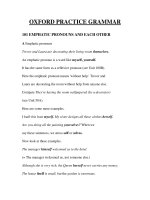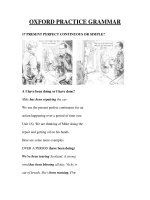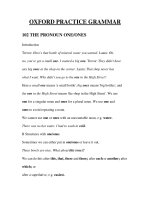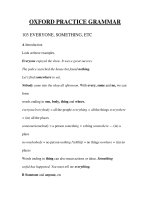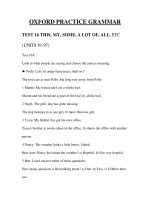OXFORD PRACTICE GRAMMAR 109
Bạn đang xem bản rút gọn của tài liệu. Xem và tải ngay bản đầy đủ của tài liệu tại đây (81.47 KB, 6 trang )
OXFORD PRACTICE GRAMMAR
109 ADJECTIVE OR ADVERB? (2)
A Friendly, likely, etc
The ending ly is the normal adverb ending (see Unit 108). But a few
adjectives also end in ly.
Melanie was very friendly. It was a lively party. We had a lovely time.
Some more examples are: elderly, likely, lonely, silly, ugly
The words are adjectives, not adverbs (NOT She-spoke to us friendly). And
we cannot add ly.
There is no such word as friendlily. But we can say in a friendly
way/manner.
She spoke to us in a friendly way. If we need to use an adverb, we often
choose another word of similar meaning.
It was lovely. Everything went beautifully.
B Hard, fast, etc
Compare these sentences.
ADJECTIVE ADVERB
We did some hard work. We worked hard.
I came on the fast train. The train went quite fast.
We can use these words both as adjectives and as adverbs:
deep, early, fast, hard, high, late, long, low, near, right, straight, wrong
(For hardly, nearly, etc, see C.
In informal English, the adjectives cheap, loud, quick and slow can be
adverbs.
ADJECTIVE ADVERB
They sell cheap clothes in the market. They sell things cheap/cheaply there.
Back already! That was quick. Come as quick/quickly as you can.
C Hard, hardly, near, nearly, etc
There are some pairs of adverbs like hard and hardly which have different
meanings.
Here are some examples.
/ tried hard, but I didn't succeed.
I've got hardly any money left, {hardly any = very little, almost none)
Luckily I found a phone box quite near. I nearly fell asleep in the meeting,
{nearly = almost)
Rachel arrived late, as usual. I've been very busy lately, {lately = in the last
few days/weeks)
The plane flew high above the clouds. The material is highly radioactive,
{highly = very)
We got into the concert free, {free = without paying)
The animals are allowed to wander freely, {freely = uncontrolled)
D Good and well
Good is an adjective, and well is its adverb. The opposites are bad and
badly.
ADJECTIVE ADVERB
Natasha is a good violinist. She plays the violin very well.
Our test results were good. We all did well in the test.
I had a bad night. I slept badly last night.
Well can also be an adjective meaning 'in good health', the opposite of ill.
My mother was very ill, but she's quite well again now. How are you? ~
Very well, thank you.
109 EXERCISES
Friendly, hard, hardly, etc (A-C)
Decide if each underlined word is an adjective or an adverb.
? That new building is rather ugly. adjective
? I'd like to arrive early if I can. adverb
1 1 haven't seen you for a long time.
2 Why are you wearing that silly hat?
3 Very young children travel free.
4 The temperature is quite high today.
5 We nearly missed the bus this morning
6 Do you have to play that music so loud?
2 Friendly, hard, hardly, etc (A-C)
Complete the conversation. Decide if you need ly with the words in brackets.
Mark: How did you get on with Henry today?
Sarah: Oh, we had a nice lunch and some (►) lively (live)conversation.
Henry was charming, as usual.
He gave me a lift back to the office, but it was (1)………………. (hard)
worth risking our lives to
save a few minutes. He (2)....................... (near) killed us.
Mark: What do you mean?
Sarah: Well, we'd sat a bit too (3)………………... (long) over our meal, and
we were
(4)……………………..(late) getting back to work. Henry drove very
(5)………… (fast). I tried
(6) ………………..... (hard) to keep calm, but I was quite scared. We went
(7)…………… (wrong)
and missed a left turn, and Henry got annoyed. Then a van came round the
corner, and it was
coming (8)………. ........ (straight) at us. I don't know how we missed it.
Mark: Well, I'm glad you did. And next time you'd better take a taxi.
3 Good and well (D)
Complete the conversation. Put in good, well (x2), bad, badly and ill.
Rachel: How did you and Daniel get on in your tennis match?
Matthew: We lost. I'm afraid we didn't play very (►) well. Daniel made
some (1)……………. mistakes.
It wasn't a very (2)…………… day for us. We played really
(3)………………………
Andrew: I heard Daniel's in bed at the moment because he isn't very
(4)………………
Matthew: Yes, I'm afraid he's been (5)………….... for several days, but he's
better now.
4 Friendly, hard, hardly, etc (A-D)
Complete the conversation. Choose the correct form.
Daniel: Is it true you saw a ghost last night?
Vicky: Yes, I did. I went to bed (►) late/lately, and I was sleeping (1)
bad/badly. I suddenly woke up in
the middle of the night. I went to the window and saw the ghost walking
across the lawn.

